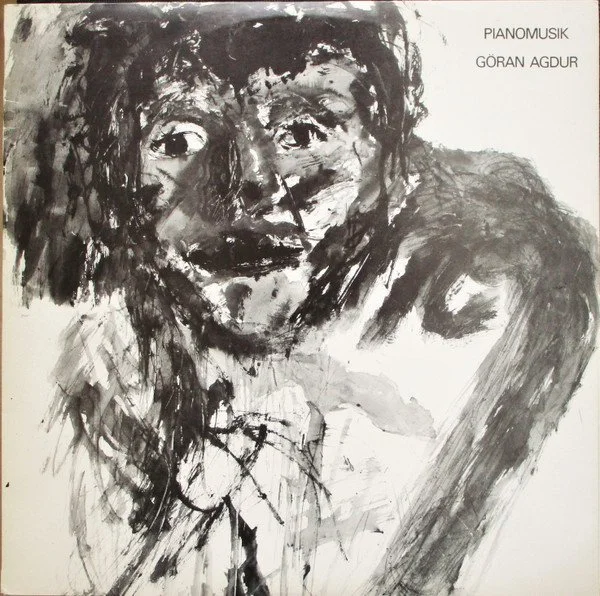The Göran Agdur Interview
Tell me about growing up in Karlstad, Sweden. What was your childhood like growing up? When did you first begin to fall in love with music, more specifically the piano? Do you have any siblings? Who were some of your earliest influences in your more formative years? Did you participate in any groups prior to become a composer?
My father worked as an engineer, my mother took care of the household, writing poems and children stories. My brother Björn is 10 years older than me and introduced me to the rock and pop songs from late 50's and 60s. My eldest brother Ulf is 11 years older than me, became a magician and played classical pieces on the square piano that my parent’s bought us where we lived in a apartment in Karlstad and Sundsvall. The piano came to be the instrument for me to express my emotions. I started taking lessons from different piano teachers. I especially remember Gunnar Söderblom who, for instance, played Bela Bartik’s “Pieces for Children” and Sigurd Ågren who let me play the Bee Gees’ “Lamplight'‘. As a composer I was self taught in the beginning, later one of my private teachers let me study Valdemar Söderholm’s “Harmonilära” where I learnt some progressions of chords and relations between harmonies. 1977 I started taking lessons in counterpoint from Swedish composer Hans Eklund at the Music Academy in Stockholm and lessons in orchestration from Gunnar Johansson. After finishing a year of law studies and my first relationship ending sadly, I quit the studies and ended an extra job I had as a caretaker at a mental hospital in the outskirts of Stockholm. I went away for a long trip in Europe and devoted myself to music. With Dutch choreographer Ingrid Dalmeyer I composed “Dutch Delight” and “Lustan’s Café” which together with the Zarouki Group were performed at the theatre houses Intiman and Oscar’s in Stockholm. The song “Chicaton” became a success from the show and was recorded by my first group Joy.
You released your debut LP “Pianomusik” in ‘78. Tell me about writing and recording this album and what that experience was like. Would you mind giving some background to songs such as “Natascha”, “Huset Usher”, and “Starlight of Zizipompom”? That following year you followed up with your sophomore album “Nest of Silence”. How did you go about creating this body of work in comparison to your previous album?
The pieces on my first album “Pianomusik” bear witness to my experiences. “Huset Usher” is inspired by the short story of Edgar Allan Poe. “Starlight of Zizipompom” is the name of my dog's grandfather. When my dear Tofsen (pompom in english) died I wrote the embryo to this piece in the night. For all animals. “Natascha” is the name of a girl in my fantasy. “Nest of Silence” is the name of a cave in Constanze, a town by the Black Sea in Romania. The story is told that a woman spent all her life in this cave waiting for her man who had gone out into sea fighting in a war. He didn't come back, but she refused to leave the cave convinced. ‘One day he will return’, she said. My first album “'Pianomusik” gained attention in the Sweedish Press and a producer named Olle Nyquist contacted me in a will to record and produce my next album “Nest of Silence” which he did. Parallel to my piano pieces I worked with songs.
I used my own English words that I thought sounded cool together with accepted ones. My friend Ingvar Karkoff, a composer and arranger, liked them and we recorded a live take at the Royal Academy of Music in Stockholm which came to be the A side of “Chicaton” with Ingvar using all sorts of tone distorters and experimentation. On the B side you can hear my experiences of traveling in Italy, Genoa and Norway’s high mountains at hotel Fefor. I travelled to Fefor with my girlfriend Marit at the time. She would scratch the spaces between her fingers on the bus. Marit was working as a nurse in a hospital when scabies had begun to spread during the war. We ended up scratching each other under thick Norwegian sheets while eating Tenutex to fight against those bastards… It inspired me to write “Parasite Nite”. The lyrics to “Mad Mind” found its embryo from when I was working in a mental hospital, Långbro, on the outskirts of Stockholm. “In With the Wind” is for anyone to interpret anyway they want. It contains life itself rolling into the future. when we're in with the wind nobody can catch us anymore. My cooperation with violinist Semmy Stahlhammer, once the first concert master at the Stockholm Royal Opera, has resulted in two albums. “Dawn Earth” and “Hands Folded”. This cooperation is very special to me. To let Semmy take care of my melody lines made me tremble with excitement.
Is there anything else you would like to further share with the readers?
The Russian Chamber Orchestra was under the leadership of conductors Sergei Proskourin and Winston Dan Vogel when they performed suite compositions throughout the years iin Kursk, Sevastopol and Moscow. This suite together with 8 new pieces will be released on an album next year in 2024 entitled “Russian Chamber Orchestra plays Göran Agdur”. Along with composer and arranger Igor Besschastny, conductor Sergei Proskourin, Tolmachevy Sisters and producer Sergei Markov, I started a project called “A Bridge over the Baltic Sea” is for Love and Peace between our people. A tour in Russia was planned with my Swedish band playing together and my friend Igor Besschastny's Russian band when the pandemic broke out in 2020. Then the war in 2022 postponed this vision. You can now listen and buy many of my compositions and songs online.







